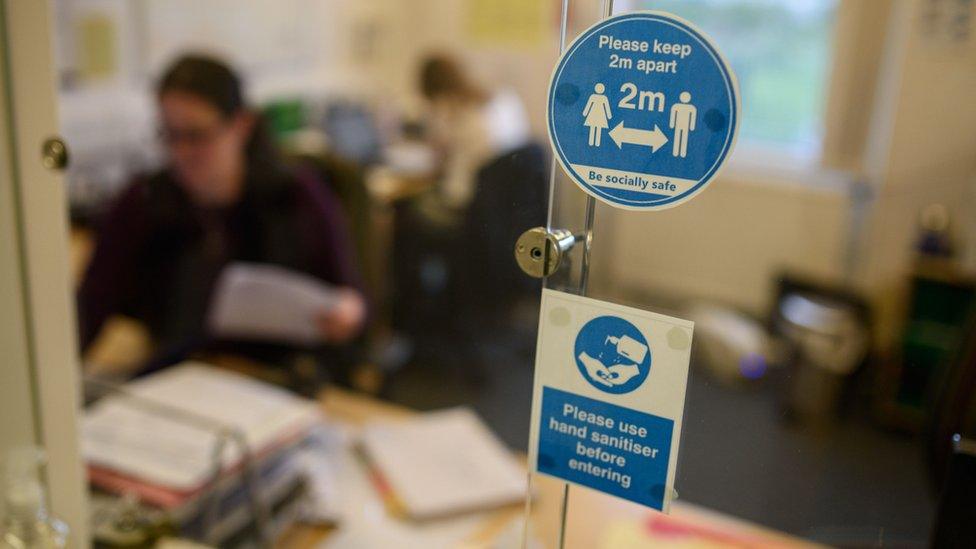Coronavirus: Tighter rules for Oldham, Pendle and Blackburn
- Published
- comments
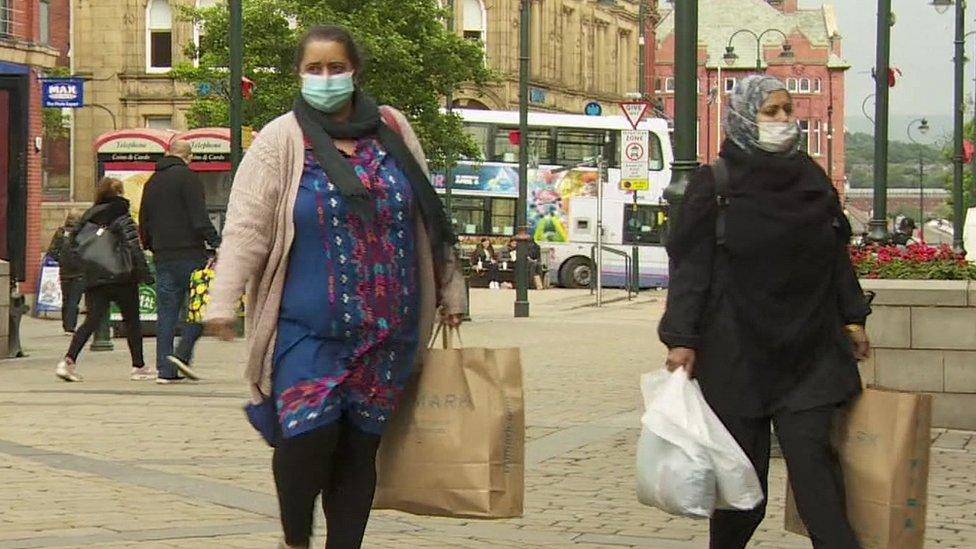
People will still be able to go shopping and go to work
Oldham and parts of Blackburn and Pendle are facing extra restrictions to stem the spread of Covid-19.
Residents in those areas are not allowed to socialise with anyone from outside their household, as of midnight on Saturday.
Workplaces, childcare facilities and businesses, including restaurants and pubs, will remain open.
Since July, the government has been introducing extra restrictions after a spike in coronavirus cases.
Elsewhere, Birmingham has been added to the government's watch list, and Northampton named an "area of intervention".
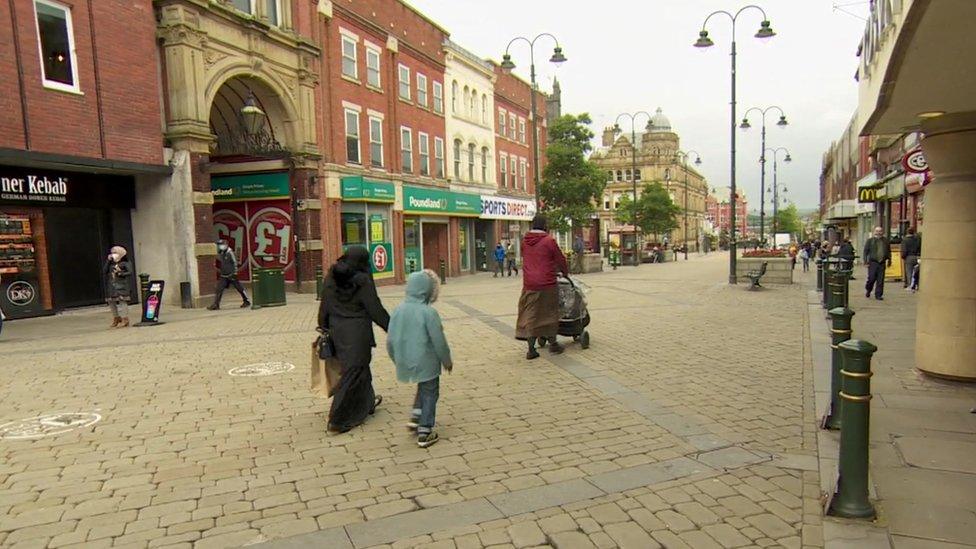
People will be advised to avoid using public transport except for essential travel
But tighter rules in Wigan, Darwen and Rossendale are to be dropped on 26 August.
Wigan and Rossendale originally faced tighter restrictions along with the rest of Greater Manchester and east Lancashire because of the wider region's overall infection rate and concerns that the virus was being spread between households.
However, both have maintained low infection rates compared with other areas.
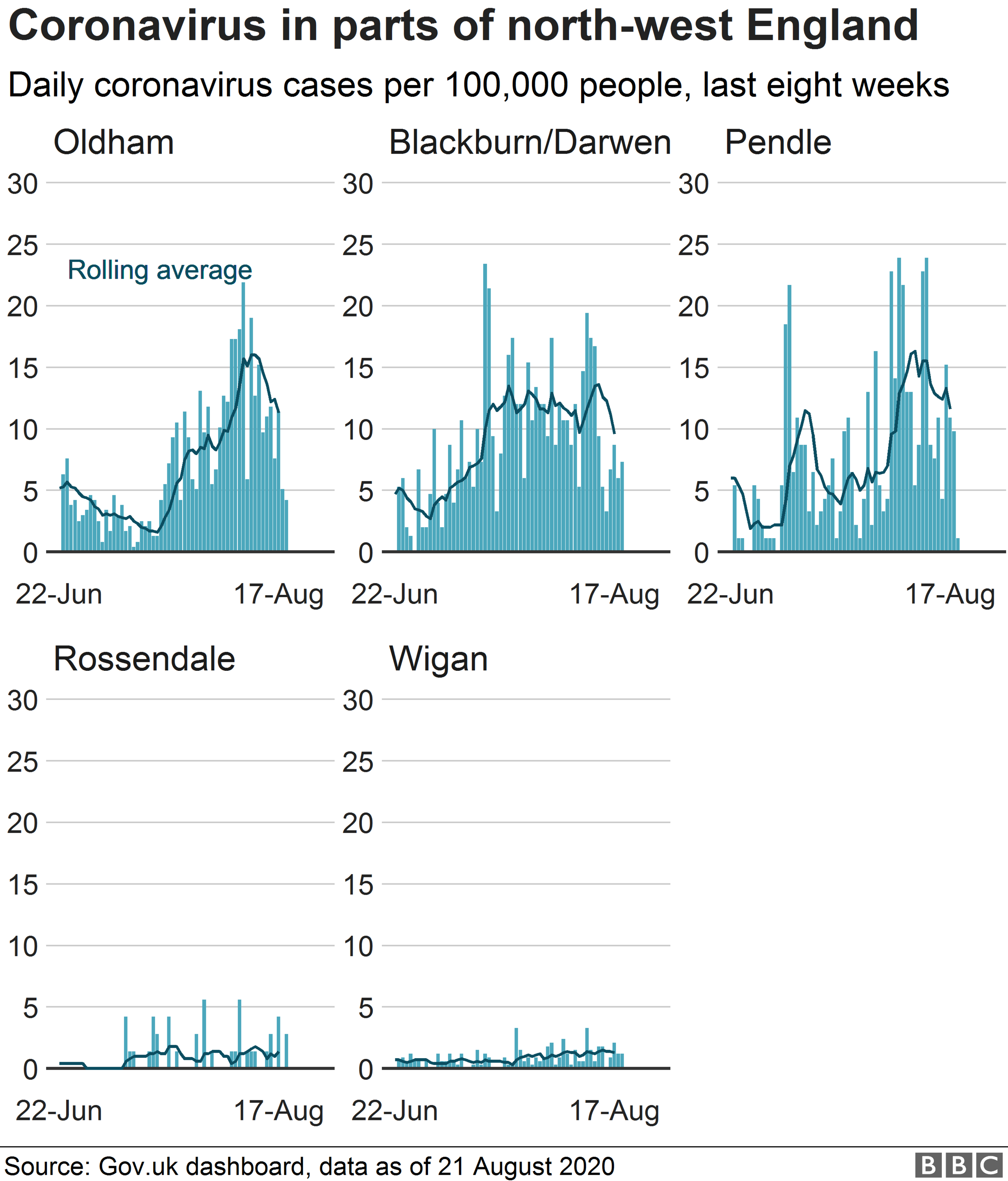

The additional measures in Oldham and parts of Pendle and Blackburn will not prevent people from shopping, going to work or attending child-care settings including schools, which open from 1 September.
However, any social activities indoors and outdoors can only be shared with people you live with and are in your immediate household.
Residents will be advised to avoid using public transport except for essential travel, and the number of people who can attend weddings, civil partnerships and funerals will be limited to household members and close family, with no more than 20 people.
Restaurants will also be encouraged to halt walk-ins, and only seat people who make reservations in advance.
Health Secretary Matt Hancock said: "To prevent a second peak and keep Covid-19 under control, we need robust, targeted intervention where we see a spike in cases.
"Our approach is to make the action we take as targeted as possible, with the maximum possible local consensus."
This will allow local councils to focus resources on the wards that need more targeted intervention, he added.

The new restrictions on household gatherings and socialising will apply to the following areas of Blackburn with Darwen: Audley & Queen's Park, Bastwell & Daisyfield, Billinge & Beardwood, Blackburn Central, Little Harwood & Whitebirk, Roe Lee, Shear Brow & Corporation Park, Wensley Fold.
Areas in Blackburn with Darwen where all restrictions have been lifted are: Blackburn South & Lower Darwen, Blackburn South East, Darwen East, Darwen South, Darwen West, Ewood, Livesey with Pleasington, Mill Hill & Moorgate, West Pennine
Existing restrictions in Pendle remain but the new rules apply to the following areas: Whitefield, Walverden, Southfield, Bradley, Clover Hill, Brierfield, Marsden

Councillor Sean Fielding, leader of Oldham Council, welcomed the announcement the town would not face business closures.
"Over the last few days we've made a clear argument that an economic lockdown was not the answer for Oldham," he said.
"Instead we put forward a strong case to [the] government for a different approach - one where we increase testing, use our powers to drive compliance and enforcement among those not currently following guidelines, and carry out intensive door-to-door engagement in areas with higher cases."
He added that he believed the tightened measures would "help reduce the spread of the virus".
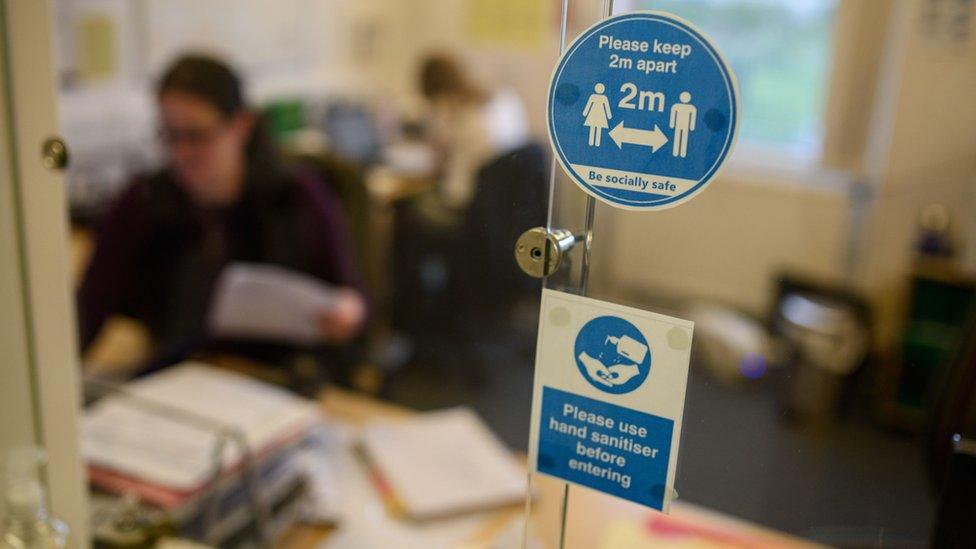
Tightened Covid-19 measures have been imposed in Oldham, Pendle and Blackburn
Greater Manchester Metro Mayor Andy Burnham said: "I think we've come to a sensible agreement with the government and I'm grateful to them for listening.
"We didn't want to see a lockdown in Oldham and we are pleased the government worked with us on that one - and we are glad the restrictions have been lifted in Wigan."
Mr Burnham added that he wanted to see "further relaxation" in Greater Manchester next week as "we are also seeing cases coming down in Trafford and Stockport".
"We are balancing protecting people against letting people live their lives - it is a really difficult question and I don't envy the government on this one," he said.
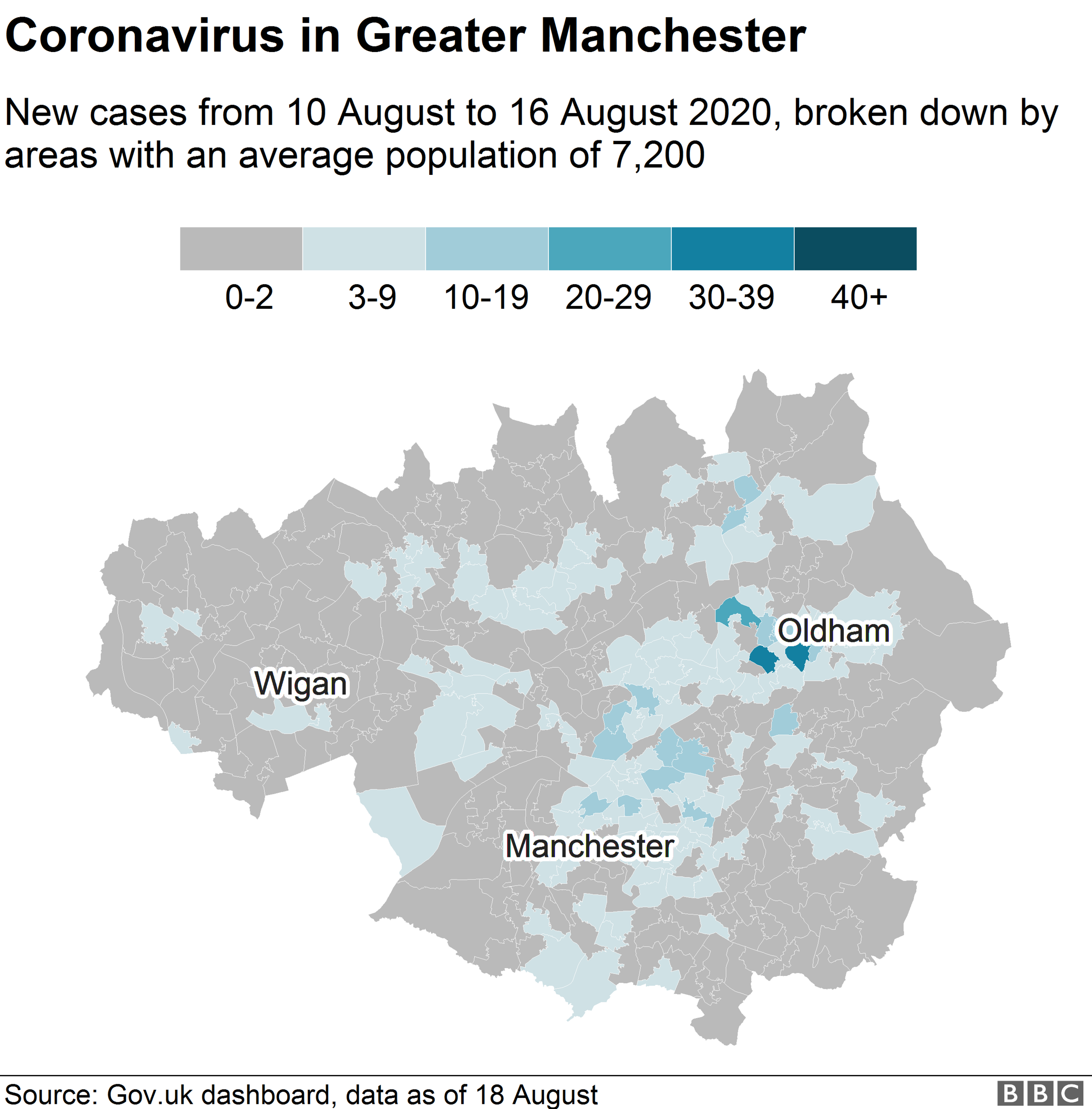

Nick Triggle, BBC Health correspondent
With the exception of Northampton, Oldham, Blackburn and Pendle have the highest rate of new infections.
They are seeing between 70 and 90 cases per 100,000 people. That is about half the rate Leicester was in when it was put into lockdown.
This move is about taking pre-emptive action before infections spiral out of control.
What testing shows is that in these places - and a number of other areas in the north west and West Yorkshire for that matter - there is community transmission, often focussed in specific neighbourhoods.
Northampton, which has the highest rate, is quite different as the cases are largely linked to a workplace.
But alongside these extra restrictions, there is also a great deal of work being done that does not get the headlines.
Council staff working hand-in-hand with community groups are knocking on doors, encouraging residents to get tested and stay safe. To help with this, extra testing facilities are opening up.
The targeted testing of people in high infection areas who are not ill is also beginning - one of the major difficulties in fighting this virus is that significant numbers do not show symptoms.
But one issue that keeps cropping up is how to get people to isolate when they have mild symptoms and staying at home means they do not get paid. Many on the ground say this needs to be resolved urgently.

The spike in Northampton was "almost solely down to an outbreak linked to the workforce at the Greencore Factory", a Department for Health spokesperson said.
Nearly 300 workers have tested positive, and employees and their households are required to isolate at home for two weeks.


The number of cases has also been "rising quickly" in Birmingham, where the majority of new cases have been among those aged between 18 and 34, a government spokesperson said.
The city recorded about 30 cases per 100,000 residents over the past week.
It has been categorised as an 'area of enhanced support', which means it will get additional testing, more local contact tracing, and targeted community engagement.
The mayor of the West Midlands believes "some people have not been strict enough" with coronavirus measures.
Andy Street said the city was in "an extremely challenging situation"., external
Birmingham City Council leader Ian Ward added that the watch list should be a "wake-up call for everyone".

Why not follow BBC North West on Facebook, external, Twitter, external and Instagram, external? You can also send story ideas to northwest.newsonline@bbc.co.uk, external
- Published19 August 2020

- Published31 July 2020
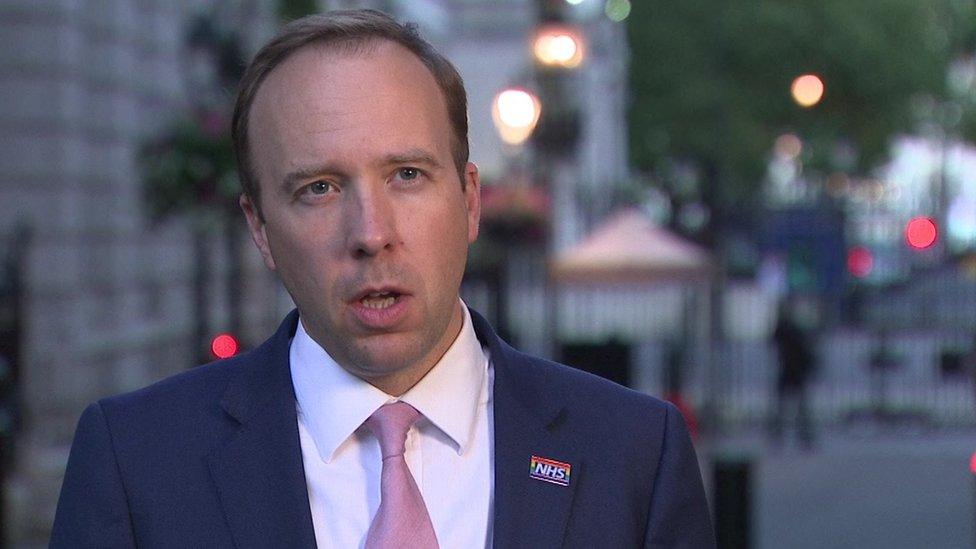
- Published29 July 2020

- Published29 June 2020
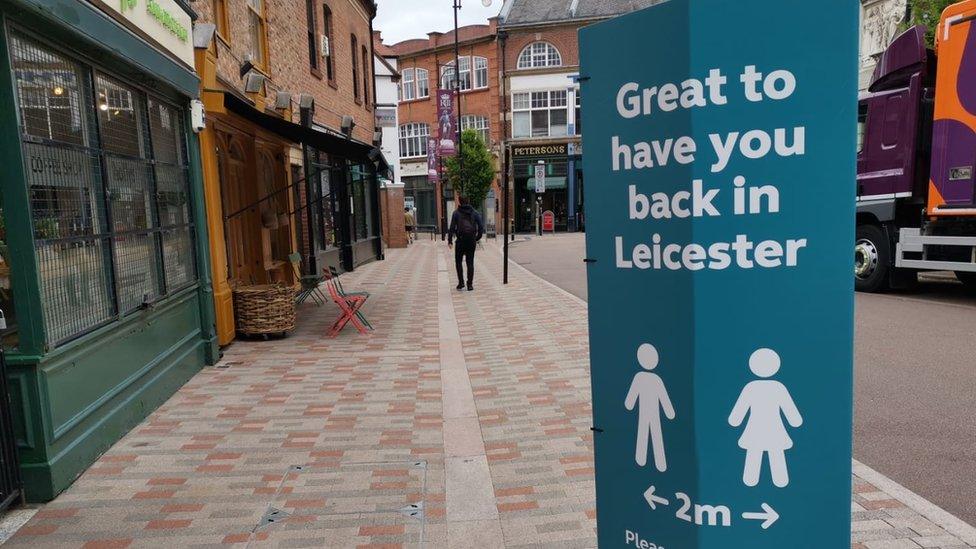
- Published28 July 2020
